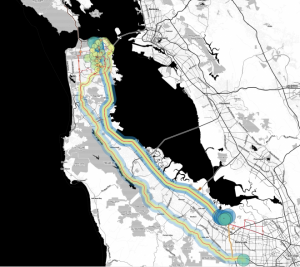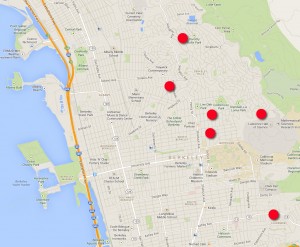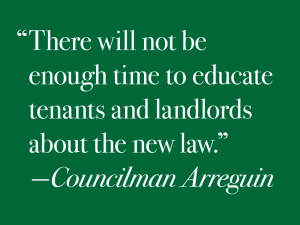 Oakland fights to close rent control loophole:
Oakland fights to close rent control loophole:
Berkeley tenants enjoy protections against bad business decisions by owners. Here, landlords can only passthrough “capital” costs if they were not foreseeable when they set the initial rent or they can’t make a fair return on their investment. In Oakland, their weaker rent control law is further undermined by broad rules which allow landlords who paid too much for a building to then raise the rents to pay their mortgage. Oakland is fighting to close this loophole even as Berkeley tenants could see passthrough rules relaxed so that landlords can charge for seismic retrofits:
“Of the ten major jurisdictions in California that have rent control laws, only four allow landlords to pass on the costs of debt service. Of those four, Oakland is the only municipality that allows landlords to force tenants to pay up to 95 percent of their debt.”
http://www.eastbayexpress.com/oakland/oakland-rent-laws-to-be-debated/Content?oid=3719780#fromMobile
In San Francisco, the rents are too damn high:
The SF Department of Public Health made an interactive map which shows how many full-time minimum wage jobs it takes to pay rent on the average market rate apartment in each SF neighborhood. For example, in the Mission District, it would take 5.5 minimum wage jobs to pay rent on a new 2-bedroom apartment, because market rent is $2,920. The actual median income of the neighborhood is about half of what it takes to pay that rent.
http://www.sfphes.org/news/211-rent-affordability-in-san-francisco
Thoughtful tech industry comments on gentrification, development, and the “Google Bus” phenomena:
“Whichever side of this issue you’re on, it’s clear that we’re looking at a reversal of the historical norm: The workers that used to live in residential suburbs while commuting to work in the city are now living in the city, while the largest technology companies are based in the suburbs and increasingly draw their labor supply from dense urban neighborhoods…That they’re young and educated and lots of them are millionaires is kind of beside the point. It’s about more than gentrification as we’ve experienced it thus far: It’s about an entirely reconfigured relationship between density and sprawl…”
This article contains a really cool map but it doesn’t show that these tech industry shuttles now pick up at MacArthur, Ashby and North Berkeley BART stations as well.
http://www.wired.com/opinion/2013/09/mapping-silicon-valleys-corporate-shuttle-problem/
Nob Hill building with 33 units would be largest Tenancy in Common:
Over in San Francisco, investors would like to use the state Ellis Act to evict rent controlled tenants and turn buildings in condominiums. Only they can’t, because like Berkeley, San Francisco has tight restrictions on how many precious affordable rent controlled units can be turned into condos each year. So speculators turn them into Tenancies-in-Common, which are like condos, only not. Pretty soon investors in Berkeley will be exploiting similar loopholes, so let’s get ready!
http://www.sfgate.com/realestate/article/Park-Lane-tenants-protest-conversion-plans-4853226.php
Meanwhile back in Berkeley, BNC issues strong statement on Demolition Ordinance:
The Berkeley Neighborhoods Council newsletter discusses how revisions to the Demo Ordinance are not only bad for tenants, but also for neighborhood stability:
“This provision puts multiple unit buildings that are well-integrated parts of neighborhoods throughout the city at risk of being demolished for no other reason than a developer sees an opportunity to replace it with a new and bigger building.”
In their September newsletter, BNC reminds everyone that the Ordinance will be discussed November 6 at the Planning Commission.
http://www.berkeleyneighborhoodscouncil.com/Newsletters/2013/Issue2/BNC_eNEWS_2_NNRaA2.htm
Speculators Driving Up Rents in East and West Oakland:
Big national companies are outbidding regular folk and buying up foreclosures all over Oakland’s flatlands, breaking up long-standing African American communities. Some firms just slap a new coat of paint on the “distressed property” and resell them right away, at prices working people can’t afford. Others are offering these homes at San Francisco-type rents, but plan to sell them in five to seven years. Several nonprofits – including Oakland Community Land Trust and Restoring Ownership Opportunities Together –are working to keep owners in their homes, or buy foreclosures and keep them affordable to working people. If you think this is going on in Berkeley, let us know!
http://www.eastbayexpress.com/oakland/whos-jacking-up-housing-prices-in-west-oakland/Content?oid=3726518







